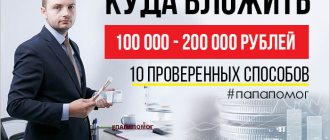Hello, dear readers of the Tyulyagin project! Today we will talk about business, or rather about the most profitable businesses for 2020. In this article I will talk about legal and honest ways to do business with high profitability. Some of the proposed business ideas have the prospect of profits of up to 500-1000% in a relatively short period of time. In the article I will give the most profitable directions for small, medium and large businesses. I will also list profitable business ideas in 2020 for both large cities with a population of over a million people and small towns.
What is business profitability and how is it measured?
Before we look at the top areas for a profitable business in 2020, let's get a few things clear—what a business is, its profitability, and how that profitability is measured.
Business is a type of commercial activity aimed at constantly generating income.
A business's profit is determined by its income minus taxes and expenses. Therefore, a profitable business, in simple words, is a business in which income significantly exceeds expenses.
The most profitable business is the business with the highest margins. That is, margin is essentially profit. Margin is the difference between the final price and cost. The higher the difference between the cost of a product/service and its selling price, the higher the margin. Margin can be measured both in monetary terms and as a percentage. Therefore, the most profitable business is a business with high-margin goods and services. In order to make a business profitable, it is necessary to find the highest-margin business ideas with stable demand. In the article you will see many examples of high-margin goods and services, for example, candles, underwear, cotton candy, hot corn, etc.
There are areas in which doing business in Russia is truly difficult. For example, for Konstantin Chaykin, a watchmaker, inventor and founder of a manufactory where luxury watches are made, relocation would be the most logical solution.
In Russia there are difficulties with recruiting personnel, with the production of components, and with logistics. Here you have to train employees yourself, produce almost everything on the basis of your own manufactory, and put up with the fact that exporting products entails additional costs.
All these problems would have been solved by transferring the business to Switzerland, where the watch industry has always been highly developed, but Konstantin decided to develop production here - and does not regret it.
Konstantin Chaykin, founder of the Konstantin Chaykin brand
“In conditions where no one shares information with you about how this or that part is created, you have to reinvent new technologies. Over the 17 years of operating the manufactory, I have come a long way; we have developed complex technological processes, unique in many ways, which were inaccessible to us.
As a result, we have no less a range of capabilities than Swiss contractors and can produce most of the components ourselves.
The problem with export remains, but compared to what it was 5-7 years ago, we have several alternative options. Exporting is more expensive than if the process took place in Switzerland, but since our product is expensive, customers are willing to pay additional costs. As a result, the problems that made us want to move to Switzerland are being solved here one way or another.
If you make a unique, sought-after product that is in demand not only within the country, but also abroad, then you are in an advantageous position.
With exports you receive stable foreign exchange earnings. Despite high taxes and additional costs, in general these advantages cover the disadvantages that exist.
If you find a foreign business with a large share of manual labor in the process itself, copy it on Russian territory and provide an export corridor, you can be quite competitive.”
The ex-CEO of Tom Tailor in Russia, Sofia Kofmann, could also run her business in Europe - this was supported by many years of experience working in a Western company and knowledge of the rules of the European market. But Sofia chose Russia to launch her own New Age Lab project for a number of reasons.
Sofia Kofmann, founder of New Age Lab
“I believe that the Russian market is good for launching projects, primarily due to speed.
In Russia, everyone is used to working at an active pace - this is a market for quick solutions.
Another main aspect is the ability to assemble a strong team. It is important for me to have top specialists and high potentials in the team, and such people usually need to be waited for. If we take only the HR aspect, then building a team in Europe can take up to a year. The search itself, communication, recruitment, contract, waiting - this will take six months at best. In Russia the timing is completely different.
In addition to speed, it should be noted that this is a promising market in terms of the consumer. The level of buyer standards in Russia, although it is separated from Europe and America in some sense, is very high. Clients have good awareness, many of them are in the “potential influencer” category. The female audience is very advanced.
The markets of America and Europe are also very saturated, and in Russia there are still many zones and segments in which there is insufficient competition. There is no such strong offer, so there are many unfilled niches. At the same time, the consumer is “hungry” and is ready for the emergence of new brands and new offers.”
Nikita Korystin, founder and director of a marketplace for complex medical equipment, thought about relocating his business in 2016–2017, when his company was just gaining financial momentum and gaining a foothold in the market.
He considered Europe and the USA, since there are more opportunities in his field there: the Russian market share is only 1.5% of global indicators, while the States have 40%, and Europe - 20%. But this turned out to be an insufficient argument.
Nikita Korystin, founder of Medek Stars
“In the USA, even in relatively small settlements, there are several oncology centers using positron emission tomographs, and in Russia there are only about 30 such medical installations. However, in the States, despite great opportunities, business is faced with a huge market saturation and high competition.
The arguments against business relocation for me were:
1. The existing sales system, which is very difficult to get into, and low margins - for sales of medical equipment in Europe it ranges from 0 to 4%. In Russia these figures are many times higher.
The main income for European companies comes from service and long-term supply contracts for 5–10 years. Therefore, for a young company that has not yet managed to loudly declare itself, forming a business in the States and Europe will be problematic.
Without significant financial resources of several tens or even hundreds of millions of dollars (euros), it is extremely difficult to become a full-fledged player in this market.
At the initial stage, the company will operate at a loss, then for another couple of years it will break even (if there is capital) and only after that will it be able to reach a 5% margin. From this point of view, organizing a business in Russia is much more profitable and easier.
2. Legal regulatory difficulties regarding the processing of personal data.
The United States and European countries have the most stringent laws regarding the protection of personal data. Companies operating through various Internet resources must carefully monitor compliance with all requirements, because the fine can reach 100 million euros. Such a payment can bankrupt any business. In Russia, legislative regulation in this regard is only developing and the amounts of fines are not so radical.
In Russia, competition is not yet so strong, although it certainly exists. In the future, you can become a leader in an expensive and developed market, increasing the company’s capitalization several times.
I think the main advantages of doing business in our country are:
1. Human resource. Using the example of my company, which is developing an innovative IT product, I can note that we cooperate with talented Russian programmers who create a competitive product much cheaper than in Europe or the USA.
2. Absence of regulatory arbitrariness. Over the years of the company’s existence, I have had to deal with various situations, but all of them were regulated within the framework of the law, so I can say that these mechanisms work in our country - provided that the company itself conducts business openly and transparently.
3. A promising market for development. Many areas that accompany business (logistics, etc.) are not yet so developed in Russia, and here is an excellent platform for creating new modern trading platforms that can rank with world leaders in terms of competition.
For less money and fewer resources, you can make a really cool product that will be no worse than that of your Western colleagues.
Talented and passionate people who follow their dreams are one of the main driving forces for the development of our country.”
Cover photo: TravnikovStudio/Shutterstock
Types of profitable business
A profitable business can be achieved by absolutely anyone, regardless of the field of activity and business idea, since in addition to the industry, field and idea, a major role is also played by the manager, the location of the team, talent, experience, skills and other variables on which the success and profitability of the business will depend.
Unfortunately, in Russia the majority of the population has a certain set of stereotypes about business, and in many ways these stereotypes are not unfounded. So, if you ask an ordinary passer-by on the street of some regional town what is profitable, then with a high degree of probability he will answer you something like stolen, privatized, and so on.
I want to immediately stipulate that in this article we will look at the main white, absolutely legal and legal, honest types of profitable business . However, I still consider listing real-life illegal forms of business that are highly profitable. So, a profitable business can be of the following types:
- illegal business (without paying taxes)
- business on a person’s psychological and vital weaknesses (dependence or hopelessness)
- business based on something forbidden (product, service)
- business built on deception
- business on faith, naivety and stupidity of people (lotto, scams, fortune telling, etc.)
- legal and honest business with high profitability and profitability
It is the last type of profitable business, based on a good idea, absolutely honest and legal, that we will consider today in this article below.
Russian Business Weeks will end with the Congress of the Russian Union of Industrialists and Entrepreneurs
Moscow, September 29. The Russian Union of Industrialists and Entrepreneurs is holding the final series of forums as part of Russian Business Weeks (16+).
“Due to the self-isolation regime introduced to prevent the spread of coronavirus infection, the NRB forums in May, June, July and early September were held via video conferences and webinars. From September 30, taking into account existing restrictions and orders, the RSPP will continue to hold NRB events in a mixed format - both in videoconferencing mode and in person with a very limited number of participants, subject to all anti-epidemiological measures. The agenda of the forums is updated in accordance with the current situation,” said Alexander Shokhin, President of the Russian Union of Industrialists and Entrepreneurs.
This year, the agenda of the NRB, where proposals on current areas of interaction between the state and business are annually discussed and developed, also includes issues of supporting the economy in the context of a decline in business activity due to the pandemic.
On September 30, the second session of the Environmental Forum “Climate risks and opportunities for the economy: the view of the state and business” will be held in person. Representatives of business and government will discuss the challenges of transboundary carbon regulation and measures to reduce greenhouse gas emissions in Russia and in the world.
On October 5, the role of technical regulation in the integration processes of the EAEU, accreditation issues in the context of the implementation of the regulatory guillotine mechanism, and the development of standardization as the basis for technical regulation will be discussed at the forum “Technical Regulation as a Tool of Eurasian Integration” via videoconference.
On October 7, the second session of the Financial Forum will be held via video conference, where they will consider anti-crisis measures in the Russian financial and banking system and further prospects for its development.
On October 13, the forum “Public Transport 2020” will take place, the purpose of which is to formulate proposals to the Government of the Russian Federation on the development and support of projects in the field of public passenger transport.
October 14 — Digital Transformation Forum.
The final event of the Russian Business Week on October 15 will be the Congress of the Russian Union of Industrialists and Entrepreneurs, where Russian President Vladimir Putin is expected to participate.
Participants in the NRB-2020 events will traditionally include deputy prime ministers of the Russian Federation, representatives of the presidential administration of the Russian Federation and the Federal Assembly of the Russian Federation, heads of key ministries and departments, members of the RUIE board bureau, heads of regional branches and industry associations of the RSPP.
The high number of participants confirms the effectiveness of the NRB as a platform for shaping areas of interaction between business and government.
Forum programs and registration for NRB-2020 events
https://nrb-rspp.ru/calendar.html
The most profitable areas of small and medium-sized businesses
As I already said, the business idea itself is not that important, about 80% will depend on other factors, including luck. This is especially true for small businesses. However, there are a number of areas and corresponding business ideas that are the most profitable. First, let's define the main areas that are most profitable for small and medium-sized businesses. And for each of the areas we will consider the most profitable business ideas.
Directions:
- Retail trade . These include: grocery and household stores, sales of women's underwear, sales of jewelry, optical salons, sales of garden decor, flower shops, wedding salons, etc.
- Household services (construction and repair, home studio, auto repair, aggregator of car services, car washes and tire fitting)
- Online trade and services (dropshipping, specialized online stores, online promotion, online advertising
- Mobile trade and services (vending, pick-up point, street food (popcorn, cotton candy, hot corn, ice cream, waffles),)
- Public catering (khinkal, fresh and smoothie bars, pancake cafe, mini coffee shop, restaurants)
- Medical and related services (pharmacies, chiropractors and massage services, private dentistry, private medical clinics, fish peeling, etc.)
- Production of food and essential goods/services (production of fruit chips, candle production, farming)
- Consulting and educational services (accounting and legal services, services for legal entities, education and child development services)
- Real estate operations (leasing mini warehouses, leasing non-residential real estate)
- Tourist services (travel agencies, hostels)
As you can see, the choice is quite large, each direction has its own unique business ideas. If the examples given were not enough for you, then at the end of the article I have prepared for you a wider list of original business ideas for aspiring entrepreneurs, as well as for small and medium-sized businesses. In addition, if you want to be more confident in the potential profitability of the business, then you can purchase an already successful franchise. In one of the articles I already spoke in detail about franchises.
Profitability statistics for small and medium-sized businesses
For those who like numbers and specifics, there are statistics that reflect the average profitability of the most popular areas and business ideas of small and medium-sized businesses. The statistics are outlined in the table below.
| № | Business area | Average profit |
| 1 | Private auditors | 0.165 |
| 2 | Chiropractors and massage services | 0.153 |
| 3 | Small wholesale bases | 0.15 |
| 4 | Cosmetic clinics | 0.15 |
| 5 | Accounting services | 0.149 |
| 6 | Private dentists, orthodontists, implantologists | 0.145 |
| 7 | Tax calculations | 0.145 |
| 8 | Law offices | 0.144 |
| 9 | MFO | 0.133 |
| 10 | Financial managers | 0.122 |
| 11 | Optical salons | 0.115 |
| 12 | Renting commercial premises | 0.111 |
| 13 | Grocery stores and manufactured goods | 0.11 |
| 14 | Property valuation | 0.11 |
| 15 | Lease of mini-warehouse premises | 0.11 |
| 16 | Investment consultants | 0.11 |
| 17 | Speech therapists | 0.103 |
| 18 | Private therapists | 0.102 |
| 19 | Market trading | 0.1 |
| 20 | Private circuses | 0.1 |
| 21 | Construction and repair | 0.09 |
| 22 | Advertising and Internet advertising | 0.085 |
| 23 | Accounting, jurisprudence, consulting | 0.075 |
| 24 | Tutoring, nannies | 0.07 |
| 25 | Massage, nurse, nurse | 0.06 |
| 26 | Organization of holidays, parties, landscaping, photography services | 0.05 |
| 27 | Atelier, watch repair and other household services | 0.045 |
| 28 | Public catering, fast food | 0.045 |
| 29 | Vending business | 0.04 |
| 30 | Hotel business | 0.03 |
Turnover of small enterprises in Moscow for 6 months. 2020 (Mosgorstat data)
| Area of activity | Turnover | Number of small enterprises, units |
| Wholesale | RUB 3.06 trillion | 16 355 |
| Construction | RUB 353 billion | 5 357 |
| Real estate transactions | RUB 135 billion | 2 120 |
| Transportation and storage | RUB 96.6 billion | 1 849 |
| Retail | RUB 95.5 billion | 1 747 |
| Car trade | RUB 59.8 billion | 1 106 |
| Hotels, restaurants | RUB 33.3 billion | 1 295 |
| Electrical equipment production | RUB 30.3 billion | 152 |
| Healthcare | RUB 15.1 billion | 784 |
| Production of computers, electronics | RUB 12.8 billion | 295 |
| Medicine production | RUB 9.97 billion | 77 |
| Manufacture of wearing apparel | RUB 8.40 billion | 150 |
| Furniture manufacture | RUB 8.38 billion | 145 |
| Rubber and plastic production | RUB 7.87 billion | 180 |
| Food production | RUB 5.82 billion | 249 |
| Sports, leisure | RUB 5.49 billion | 253 |
| Machine repair, installation | RUB 5.19 billion | 430 |
| Printing | RUB 4.14 billion | 229 |
| Paper production | RUB 3.61 billion | 53 |
| Textile production | RUB 1.65 billion | 68 |
| Beverage production | RUB 1.32 billion | 16 |
We also had the opportunity to compare the amount of revenue of individual entrepreneurs in Moscow. True, Mosgorstat at this stage provides data only for 2020, however, from these figures one can draw conclusions about the profitability of a particular business.
For example, it is immediately noticeable that individual entrepreneurs in Moscow earn good money from real estate transactions. The capital's real estate market is very attractive. Even in times of serious financial crises, apartments in Moscow are willingly bought and rented.
It should also be noted that many Muscovites today register as individual entrepreneurs in order to legally rent out their apartments and pay taxes. Considering that a simple one-room apartment can bring in 35-40 thousand rubles a month, then over the course of a year a decent amount accrues, for which you need to report to the tax office.
Also, many metropolitan individual entrepreneurs are engaged in retail trade. If we divide the total revenue by the number of individual entrepreneurs who work in this direction, it turns out that each metropolitan individual entrepreneur receives a little more than 4.2 million rubles per year. In the field of wholesale trade, the revenue per individual entrepreneur is about 13 million rubles. Car trading brings each individual entrepreneur about 8 million rubles.
The most profitable large business
Specifically, here we will present the most profitable areas for large businesses in Russia. Russia is a country with high mineral reserves, and therefore the most profitable sectors are oil and gas and metallurgy. In addition, banking business has also become highly profitable in recent years. The most profitable large business in Russia:
- Oil and gas sector
- Metallurgical sector
- Banking sector
If you follow world practice, the highest profits in recent years have come from technology corporations and giants.
The most profitable business in Moscow and cities with a population of over a million
It's no secret that business in large cities and small towns can differ significantly. Moscow, St. Petersburg and other large cities with a population of more than 1 million people have their own distinctive features, way of life and lifestyle that directly affect business. So in large cities, most people have much less free time and a greater variety of goods and services on the market. Due to this, the market and business in such cities are more fierce and competitive. Due to lack of time, whole new areas and areas of business are emerging, for example, business related to delivery and courier services, household services and other mobile types, Internet business in the form of online courses and consultations are developing well. Below I have listed just a few areas that will be profitable in large cities with proper organization and management in 2020:
- Coworking center
- Floromat (vending with flowers)
- Water delivery
- Services for children
- Online Courses
- Festive decor (event decor)
- Business on Amazon.com
- Home services (cleaning, home cook, massage)
- Dropshipping
- Psychologically clubs
- Cosmetic tattoo
- Pet care
What business is in demand now?
Supply is formed by demand. This is one of the main economic laws, therefore, in order to open the most popular business, you need to determine what products and services the population of your city needs. It is believed that in any region, the greatest demand is for organizations engaged in repairs, replacement of plumbing fixtures, and sales of household chemicals and products. An analysis of the market for services and goods will help you find out more precisely which business is relevant now.
Demand for services
According to statistics, employment agencies are very popular: the crisis and constant layoffs increase the need for such organizations. Demand for the services of plumbers, hairdressers, electricians and funeral directors remains unchanged. In Moscow and other large cities, companies providing commercial transportation come first in terms of the number of requests. Organizations from the beauty and health sector are only 1% behind in the top. By finding out which services are in greatest demand among the population, you can organize a profitable business.
What is profitable to sell now?
Aspiring entrepreneurs like to wonder what people are in demand right now. Current products remain the same. Example of high-margin products: flowers, drinks, jewelry, handmade products. Such goods are distinguished by stable demand, low production and storage costs. Popular alcoholic drinks are considered popular products.
What kind of business is in demand now in a small town?
Beginning entrepreneurs bypass small settlements. In their opinion, business there brings in very little income. This is partly true, because salaries there are lower than in big cities. The costs of renting and purchasing premises will also be less than in big cities, so you can organize your own business with minimal financial costs.
The most popular business in a small town is a general hairdressing salon. In addition to hairdressers, there should be manicure-pedicurists, cosmetologists and massage therapists. Shoe and furniture repair shops are popular regardless of the financial situation of the country, because... people tend to restore old things because they are afraid of spending a lot of money.
The most profitable business in small towns
Business in the regions, and especially in small regional towns, has its own characteristics. Despite the fact that in most regions and cities most business ideas have long been implemented, competition in 2020 still makes it possible to enter and conquer the market quickly. So the most profitable business ideas for small towns are:
- Grocery/household goods store
- Beauty salon, cosmetic services
- Optics salon
- Fitness club
- Selling Chinese/inexpensive decorative items
- Discounter (inexpensive store) clothing
- Bakery
- Vending
- Business on social networks (YouTube, Instagram, VK, etc.)
- Self-service car wash
- Creative store
- Yoga Studio
- Burger
- Contact cafe
- Street food
- Agricultural production, production and installation of greenhouses
- Animal breeding
- Apiary
- Fisheries
- Seedlings for sale
As you can see, some of the examples are quite banal, but in some cities the competition is so low that even in 2020 there are not enough grocery stores and beauty salons. Most of the listed business ideas also do not require large investments from a novice entrepreneur. So the simplest option is Vending.
Examples of billion dollar business ideas
Finally, I will give you a few real stories about starting a business that later led to billions in profits. There are quite a lot of such stories and who knows, maybe in a few years you will join this list.
- Amazon online store . The corporation of Jeff Bezos, one of the richest people on the planet, from a small business idea of an online bookstore, has grown into the largest online store on the planet with a capitalization of $1 trillion.
- Sweet Corporation by Michel Ferrero . Michel Ferrero and his family decided to produce chocolate and sell it for breakfast instead of regular butter for toast and sandwiches. Their company's products today include world-famous sweets brands - Kinder, Tic Tac, Ferrer Rocher and Nutella. The company's value today exceeds $10 billion .
- Storage Lockers by Brad Hughes . The idea of installing automated storage warehouses along highways has generated more than $5 billion .
- The drink that gives you wings is Red Bull . The business idea of a new energy drink for sports and active youth brought Dietrich Mateschitz and Kaleo Juvidich more than $3 billion each.
- Sweets from brothers Paul and Hans Reigel. Their world-famous HARIBO and other sweets in all shapes and forms generated $1.5 billion each.
There are many other striking examples of corporations growing from one simple idea into something new and unusual. Therefore, do not be afraid to try and experiment, perhaps your idea will appeal to millions of people around the world, and will bring you huge profits.
And that’s all for today about the most profitable business in 2020. Soon I will supplement the article and talk about individual business ideas more specifically. Therefore, subscribe to the newsletter of articles by e-mail. Good luck and see you again on the pages of the Tyulyagin !
Revenue volume of individual entrepreneurs in Moscow in 2020 (Mosgorstat data)
| Area of activity | Revenue volume | Number of individual entrepreneurs |
| Real estate transactions, rental | RUB 211.8 billion | 38686 |
| Retail | RUB 155 billion | 36954 |
| Wholesale | RUB 66.6 billion | 5055 |
| Car trade | RUB 24.8 billion | 2842 |
| Transport, communications | RUB 17.2 billion | 5116 |
| Construction | RUB 13.6 billion | 1824 |
| Hotels and restaurants | RUB 7.3 billion | 1287 |
| Textile and clothing production | RUB 4.8 billion | 920 |
| Education | RUB 4.2 billion | 2120 |
| Healthcare | RUB 2.4 billion | 568 |











